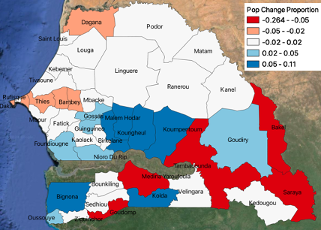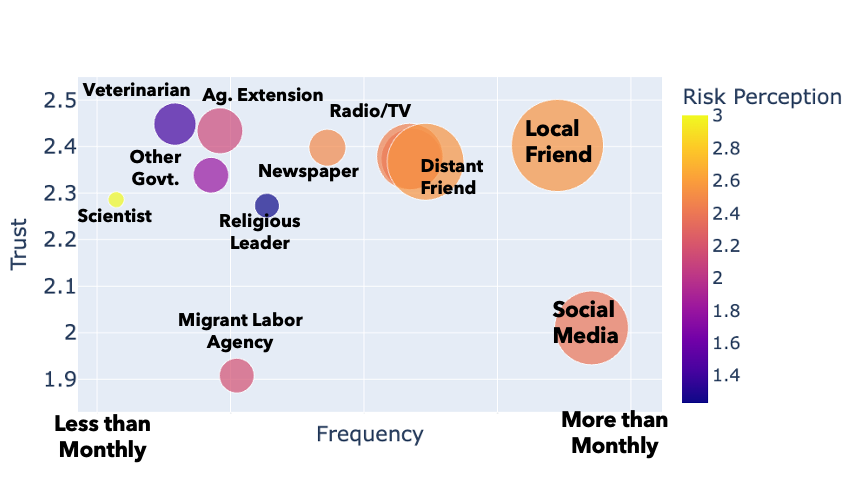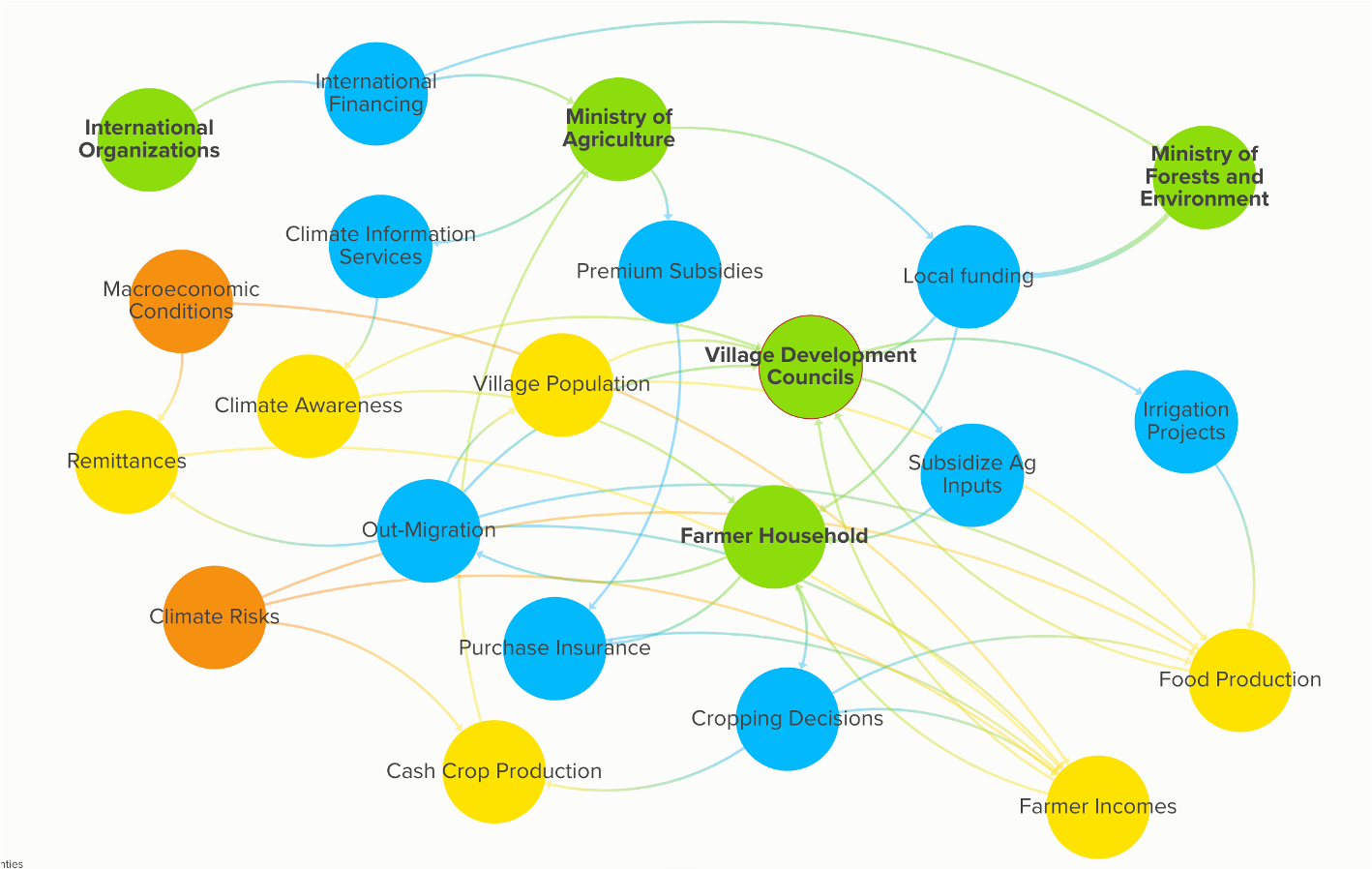Current Research
Investing with Foresight: A Participatory Agent-Based Model of Livelihood Aspirations and Capabilities in Senegal
with Andrew Reid Bell, Fabien Cottier, Alex de Sherbinin, and a multi-stakeholder group of migration and development professionals

Summary
Developing country governments must navigate difficult tradeoffs in public infrastructure investments, often with limited financial resources. These tradeoffs are exacerbated by increasing climate risks that threaten to constrain development trajectories through impacts on economic sectors, e.g. agriculture, and contribute uncertainty to individual livelihood decisions. Here, we analyze the role of human capital investments through an agent-based model of individual livelihood decisions in an emerging economy context. Our novel approach incorporates theoretical insights from the migration aspirations-capabilities framework, which allows us to computationally represent how agents evaluate the potential payoffs of near-term investments (specifically, migration and higher education) in terms of future livelihood opportunities. We apply this model to analyze the role of educational investments in providing resilience to climate shocks in the West African nation of Senegal, which is currently developing a strategy for expanding access to higher education across its diverse demography and geography. We find that increased access to higher education is a particularly beneficial investment to providing livelihood resilience against short- and medium-onset climatic shocks, foremost droughts in agriculturally-dependent regions of the country. By contrast, access to higher education may not be a sufficient strategy to counter longer-term threats, e.g. sea level rise and increased salinity, which may fundamentally reshape economic opportunities available to Senegalese residents.How Do Information and Social Capital Affect Smallholder Farmer Livelihood Risk Perceptions?
with Dirgha Ghimire, Michael Oppenheimer, Rajendra Ghimire, Indra Chaudhaury, and Dil CK

Summary
Increasing climate risks are likely to threaten the livelihoods of many of the world’s 500 million smallholder farming households. Previous scholarship has demonstrated that access to accurate climate information may enhance farmers’ adaptive capacity, including adaptive rural-urban migration, but evidence is mixed on how farmers actually integrate such information in their decision-making. In this study, we analyze how farmers’ information sources, social networks, and previous exposure to hazards shape climate risk perceptions and livelihood decisions. Informed by the New Economics of Labour Migration, Protection Motivation Theory, and Security-Potential Aspiration frameworks, we collected data from 500 households in Nepal’s Chitwan Valley on farmers’ livelihood choices from 2015-2021, climate risk perceptions, and access to informational and social capital. We find that climate risks are highly salient to farmers' perception of general livelihood risks, including non-farm livelihoods. The effects of climate on perceived risks of non-farm livelihoods, including migration and off-farm labor, may be one factor tempering adaptation responses to climate hazards. For some hazards, including droughts and groundwater risks, access to greater informational and social capital may decrease risk perceptions, but also contribute to an increased propensity to adopt adaptation strategies. Finally, we find that while farming households generally maintain diversified income portfolios, they tend to rely even more on perceived high-risk strategies during climate-driven shocks. Our results indicate that efforts to build farmers' resilience should especially account for risk perceptions of livelihood alternatives and loss-averse behavior in response to income shocks.I have presented this paper at the 2022 Wittgenstein Centre and 2023 Population Association of America conferences.
Robust Climate Adaptation Policies for Subsistence Agriculture
with Frank Errickson, Michael Oppenheimer, and Anil Babu Pokhrel

Summary
Farmers make livelihood decisions in deeply uncertain environments regarding weather conditions, economic markets, and the social-political systems in which they operate. In turn, uncertainty in how farmers make such decisions challenges the ability of policymakers at multiple governance scales to achieve key objectives such as maximizing economic growth, minimizing inequality, ensuring food security, and limiting rates of outmigration. Farming households and policymakers must therefore make climate adaptation decisions under exogenous sources of deep uncertainty, e.g. unknown probability distributions of climatic and economic states of the world, and endogenous deep uncertainty resulting from misalignment or misunderstanding of objectives among key stakeholders in a system. Here, we propose an integrated robust decision-making – agent-based model (RDM-ABM) framework to analyze how both types of deep uncertainty affect the robustness of potential climate adaptation policy interventions in the agricultural sector of Nepal. Our work expands on a previous analysis of smallholder farmer livelihood decisions under climate risk by incorporating endogenous feedbacks between policymakers at multiple levels of government, international development agencies, and farming households. We apply this framework to investigate how real-world complexities of the policymaking process – including potentially competing objectives, misalignment between scales of policymaking, and lags in policy implementation – affects the robustness of proposed climate adaptation policies for subsistence agriculture in Nepal.I have presented this paper at the 2022 Society for Decision-Making under Deep Uncertainty Conference.
